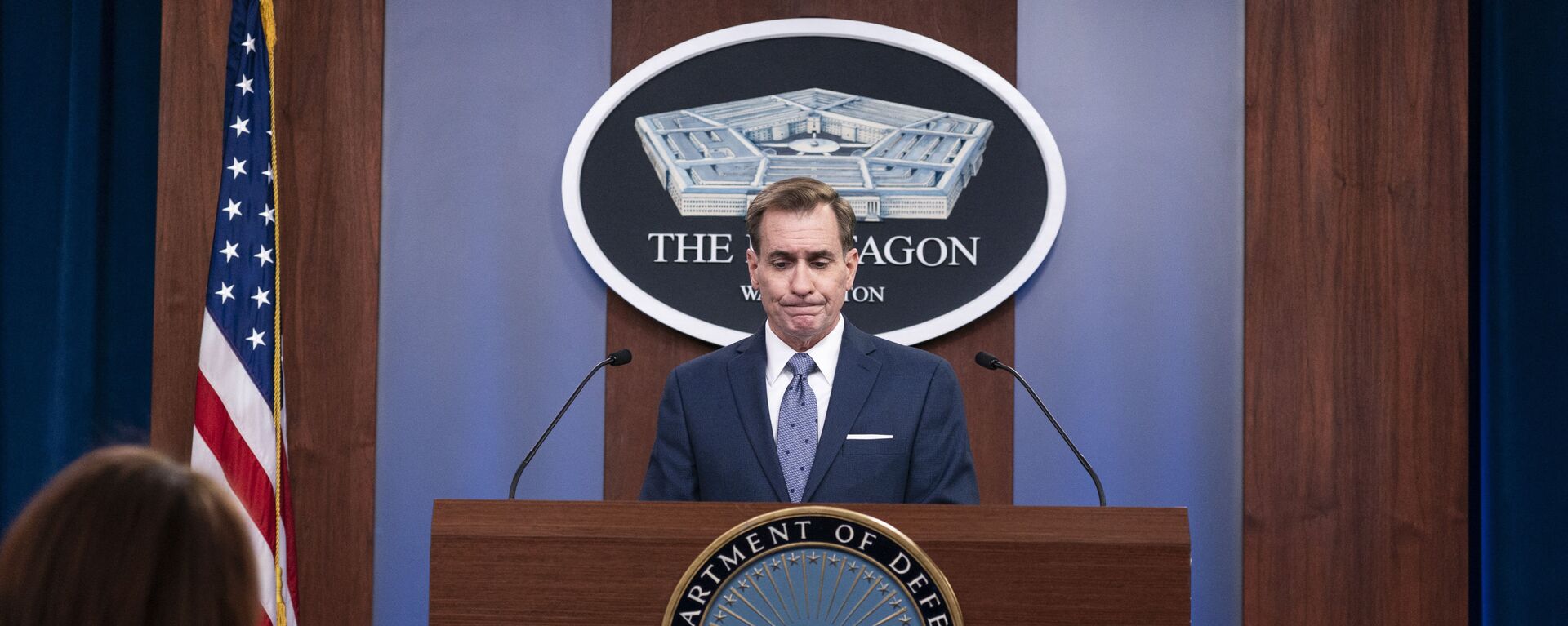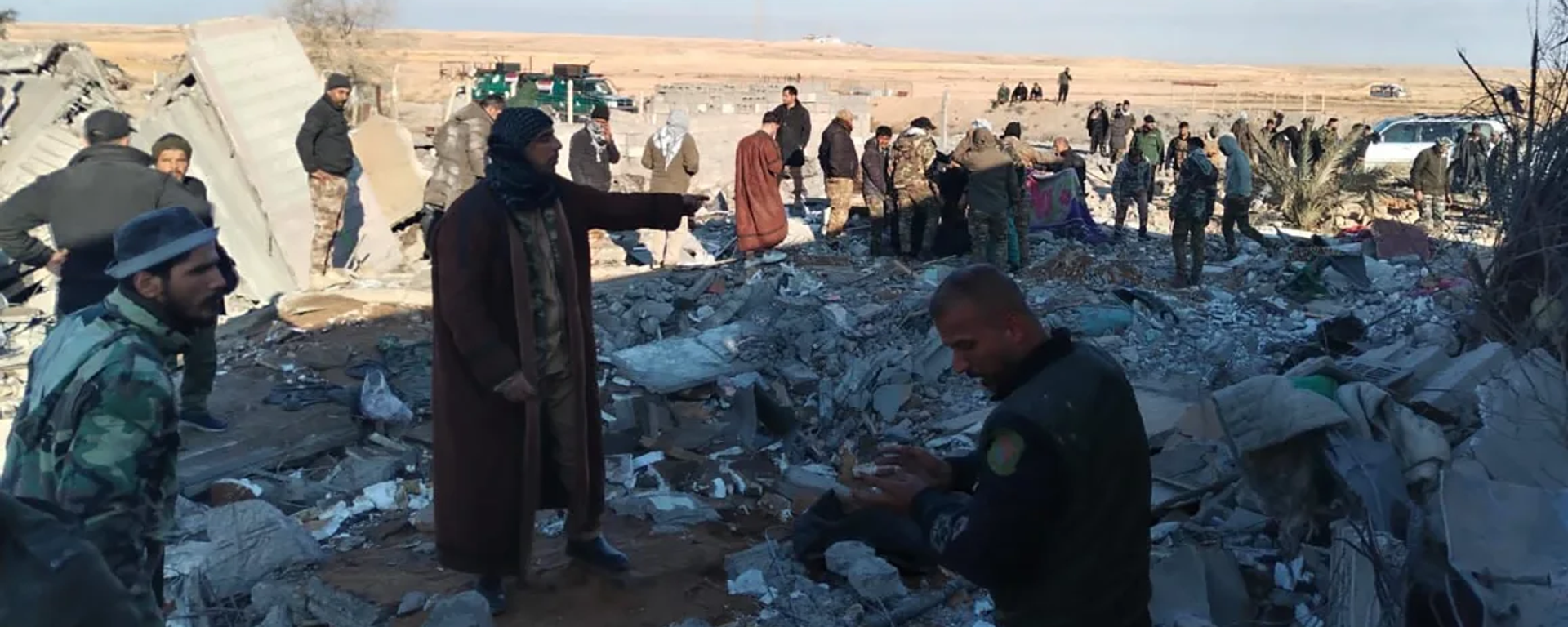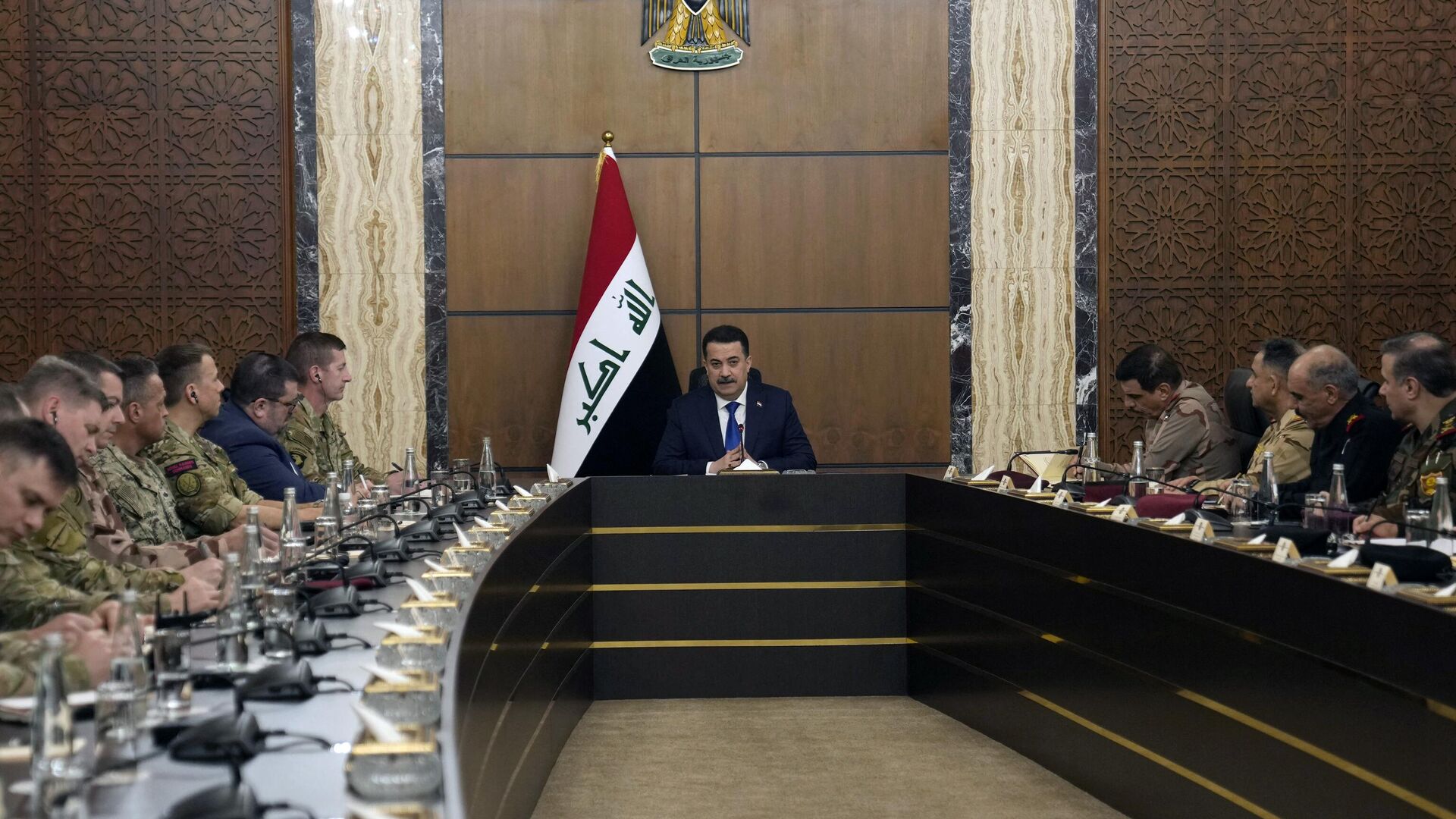https://sputnikglobe.com/20240225/consensus-formed-on-expelling-us-forces-from-iraq-pms-top-security-advisor-says-1116969870.html
‘Consensus’ Formed on Expelling US Forces From Iraq, PM’s Top Security Advisor Says
‘Consensus’ Formed on Expelling US Forces From Iraq, PM’s Top Security Advisor Says
Sputnik International
Baghdad began formal talks with the US last month on a “phased withdrawal” of American forces from Iraq amid repeated violations of the country’s sovereignty by Washington, including through US attacks on government-allied anti-terror militias which have played a key role in operations to smash IS’s* self-proclaimed caliphate.
2024-02-25T12:33+0000
2024-02-25T12:33+0000
2024-02-25T13:36+0000
world
middle east
john kirby
qasem soleimani
bashar assad
iraq
baghdad
foreign ministry
washington
us
https://cdn1.img.sputnikglobe.com/img/07e8/02/19/1116969689_0:160:3072:1888_1920x0_80_0_0_7ff4e81a50d5f9c51194d9e7ab769c0d.jpg
A consensus has emerged among all of Iraq’s major political factions on ending the US-led military coalition’s presence in the Middle Eastern country, Qasim al-Araji, Iraq’s national security advisor, has announced.“Our security forces have developed greatly and gained great experience in dealing with the challenges of terrorism,” a-Araji assured, implying that the US "train, advise and assist" mission in Iraq, which replaced its combat mission in late 2021, is no longer needed.Iraq’s National Security Council, which al-Araji heads, is a powerful body in charge of coordinating the country’s national security, intelligence and foreign policy strategy, and reports directly to Prime Minister Mohammed Shia’ Al-Sudani.US bases in Iraq and its illegal outposts in Syria came under intense rocket, missile and drone attack by militias beginning in mid-October 2023 in response to Washington’s unwavering support for Israel amid its war in Gaza.The US has responded to the attacks by striking senior militias closely affiliated with Iraq’s security forces, with a January 4th strike killing Mushtaq Talib al-Saidi, the leader of the Popular Mobilization Forces’ affiliated Harakat-al-Nujaba militia, prompting Iraqi officials to demand talks on the end of the US presence in the country. Iraq’s Foreign Ministry called the al-Saidi strike as an “unprovoked attack on an Iraqi security body operating in accordance with the powers granted to it by the Commander-in-Chief of the Armed Forces,” and called the aggression a “dangerous escalation” to which Baghdad reserves the right to respond.Washington further angered its Iraqi counterparts by lying to media about providing Baghdad with advance warning ahead of its ongoing strikes, with State Department spokesman John Kirby admitting in early February that the US had actually only “informed the Iraqis immediately after the strikes occurred.”Last month’s aggression isn’t the first time the US military has acted unilaterally inside Iraq without informing its Iraqi "partners." In January 2020, the US assassinated Iraqi Popular Mobilization Forces deputy commander Abu Mahdi al-Muhandis alongside Iranian Islamic Revolutionary Guard Corps Quds Force commander Qasem Soleimani in an unprovoked drone strike at Baghdad International Airport. That incident prompted Iraq’s parliament to issue a resolution demanding that all US forces be expelled from the country immediately, but Washington resisted, instead reclassifying its presence in the country as a "train, advise and assist" mission.In neighboring Syria, which has also faced US strikes targeting anti-terror fighters, the Foreign Ministry said it was “not surprised” in the slightest to see American forces strikes targets in the country’s east, “where our forces are fighting against the remnants of the ISIS* terrorist organization, while the United States is working to revive ISIS terrorist activity.”US forces maintain control over the northeastern portion of Syria, sitting on top of its most energy and food-rich areas, and robbing the war-torn country of the resources it needs to complete reconstruction in the aftermath of a decade-long CIA-fueled dirty war aimed at overthrowing the Assad government.* IS, also known as ISIS, ISIL, and Daesh, is a terrorist group outlawed in Russia and many other countries.
https://sputnikglobe.com/20240205/us-lied-about-warning-iraq-in-advance-of-strikes---state-department-admits-1116608727.html
https://sputnikglobe.com/20240203/strikes-against-anti-isis-militias-in-syria-and-iraq-prove-us-war-on-terror-is-a-sham-1116574680.html
iraq
baghdad
washington
Sputnik International
feedback@sputniknews.com
+74956456601
MIA „Rossiya Segodnya“
2024
News
en_EN
Sputnik International
feedback@sputniknews.com
+74956456601
MIA „Rossiya Segodnya“
Sputnik International
feedback@sputniknews.com
+74956456601
MIA „Rossiya Segodnya“
why are us troops still in iraq, can iraq force us troops out, why can't iraqi government kick us troops out of iraq
why are us troops still in iraq, can iraq force us troops out, why can't iraqi government kick us troops out of iraq
‘Consensus’ Formed on Expelling US Forces From Iraq, PM’s Top Security Advisor Says
12:33 GMT 25.02.2024 (Updated: 13:36 GMT 25.02.2024) Baghdad began formal talks with the US last month on a “phased withdrawal” of American forces from Iraq amid repeated violations of the country’s sovereignty by Washington, including through US attacks on government-allied anti-terror militias that have played a key role in operations to smash IS’* self-proclaimed caliphate.
A consensus has emerged among all of Iraq’s major political factions on ending the US-led military coalition’s presence in the Middle Eastern country, Qasim al-Araji, Iraq’s national security advisor, has announced.
“There is a consensus on the withdrawal of foreign forces. The Iraqi government will sign bilateral security agreements with the countries that are part of the coalition against the Daesh* terrorist group,” al-Araji said on the sidelines of the Baghdad International Dialogue Conference on Saturday.
“Our security forces have developed greatly and gained great experience in dealing with the challenges of terrorism,” a-Araji assured, implying that the US "train, advise and assist" mission in Iraq, which replaced its combat mission in late 2021, is no longer needed.
Iraq’s National Security Council, which al-Araji heads, is a powerful body in charge of coordinating the country’s national security, intelligence and foreign policy strategy, and reports directly to Prime Minister Mohammed Shia’ Al-Sudani.
US bases in Iraq and its illegal outposts in Syria came under intense rocket, missile and drone
attack by militias beginning in mid-October 2023 in response to Washington’s unwavering support for Israel amid its war in Gaza.
The US has responded to the attacks by striking senior militias closely affiliated with Iraq’s security forces, with a January 4th strike
killing Mushtaq Talib al-Saidi, the leader of the Popular Mobilization Forces’ affiliated Harakat-al-Nujaba militia, prompting Iraqi officials to demand talks on the end of the US presence in the country. Iraq’s Foreign Ministry called the al-Saidi strike as an “unprovoked attack on an Iraqi security body operating in accordance with the powers granted to it by the Commander-in-Chief of the Armed Forces,” and called the aggression a
“dangerous escalation” to which Baghdad reserves the right to respond.
Washington further angered its Iraqi counterparts by lying to media about providing Baghdad with advance warning ahead of its ongoing strikes, with State Department spokesman John Kirby admitting in early February that the US had actually only “informed the Iraqis immediately after the strikes occurred.”

5 February 2024, 19:54 GMT
Last month’s aggression isn’t the first time the US military has acted unilaterally inside Iraq without informing its Iraqi "partners." In January 2020, the US assassinated Iraqi Popular Mobilization Forces deputy commander Abu Mahdi al-Muhandis alongside Iranian Islamic Revolutionary Guard Corps Quds Force commander Qasem Soleimani in an unprovoked drone strike at Baghdad International Airport. That incident prompted Iraq’s parliament to issue a resolution demanding that all US forces be expelled from the country immediately, but Washington resisted, instead reclassifying its presence in the country as a "train, advise and assist" mission.
In neighboring Syria, which has also faced US strikes targeting anti-terror fighters, the Foreign Ministry said it was “not surprised” in the slightest to see American forces strikes targets in the country’s east, “where our forces are fighting against the remnants of the ISIS* terrorist organization, while the United States is working to revive ISIS terrorist activity.”
US forces maintain control over the northeastern portion of Syria, sitting on top of its most energy and food-rich areas, and robbing the war-torn country of the resources it needs to complete reconstruction in the aftermath of a decade-long CIA-fueled dirty war aimed at overthrowing the Assad government.

3 February 2024, 17:58 GMT
* IS, also known as ISIS, ISIL, and Daesh, is a terrorist group outlawed in Russia and many other countries.




